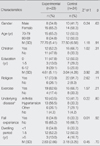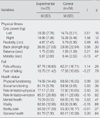Abstract
Purpose
The purpose was to identify the effects of a Tai Chi exercise program on physical fitness, fall related perception and health status among institutionalized elderly.
Methods
A quasi-experimental research was carried out with a nonequivalent control group pretest-posttest design. There were 23 subjects in the experimental group and 24 in the control group. The data was gathered by structured questionnaires about fall related perception, and health status. Physical fitness was measured by an exercise therapist with a blind principle.
Results
At the completion of the 12 weeks Tai Chi exercise program, flexibility (F=4.50, p=.00), and ability to balance (F=3.27, p=.00) had increased significantly. Fall related perception showed significant improvement in the fear of falling (F=-3.52, p=.00). Physical functioning (F=3.38, p=.00), role limitation-physical (F=2.67, p=.01), role limitation-emotional (F=2.47, p=.02). and general health (F=3.88, p=.00) in health status showed significant differences between the two groups.
Conclusion
The study findings revealed Tai Chi exercise as a useful nursing intervention for elderly that enhances flexibility and balance, decreases fall related perception and also increases the health status. Further research is warranted to compare the potential effects of Tai Chi exercise and its health benefits from other types of exercise or martial arts.
Figures and Tables
References
1. Ane JS. Influences of taijiquan training moderns' mind and body health. 2002. Iksan: Wonkwang University;Unpublished master's thesis.
2. Chang CM. A structural model for falls and quality of life in elderly people living at home. 2005. Seoul: KyungHee University;Unpublished doctoral dissertation.
3. Choi JH. The effects of tai-chi exercise on physiological, psychological functions and falls among fall-prone elderly. 2002. Seoul: Catholic University of Korea;Unpublished doctoral dissertation.
4. Eom AY. Development and application of early rehabilitation program using Yang-style tai chi exercise for breast cancer patients after mastectomy. 2006. Seoul: Seoul National University;Unpublished doctoral dissertation.
5. Hong Y, Li JX, Robinson PD. Balance control, flexibility, and cardiorespiratory fitness among older Tai Chi practitioners. British Journal of Sports Medicine. 2000. 34:29–34.

6. Jeon MY, Jeong HC, Choe MA. A study on the elderly patients hospitalized by the fracture from the fall. Journal of Korean Academy of Nursing. 2001. 31:443–453.

7. Jung YS. A meta analysis of the effects of exercise programs in the elderly. 2005. Seoul: Ewha Women's University;Unpublished doctoral dissertation.
8. Kim J. Effects of taijiquan training on ambulation and balance for the elderly women with balance disorder. 2004. Seoul: Kuk Min University;Unpublished master's thesis.
9. Koh SB, Chang SJ, Kang MG, Cha BS, Pack JK. Reliability and validity on measurement instrument for health status assessment in occupational workers. Journal of Preventive Medicine. 1997. 30:251–266.
10. Korea Social Index. 2006. 11. Retrieved July 29, 2008. Korea National Statistical Office;from http://www.nso.go.kr.
11. Kutner NG, Barnhart H, Wolf SL, Mcneely EX. Self-report benefits of Tai Chi practice by older adults. Journal of Gerontology Series B Psychological Sciences and Social Science. 1999. 52:242–246.

12. Lan C, Lai JS, Chen SY, Wong MK. Tai Chi chuan to improve muscular strength and endurance in elder individuals: A pilot study. Archives of Physical Medicine and Rehabilitation. 2000. 81:604–607.
13. Lee HY. Comparison of effect among tai-chi exercise, aquatic exercise, and seif-help management programs for patients with knee osteoarthritis. 2005. Seoul: Seoul National University;Unpublished doctoral dissertation.
14. Pack ZM. Variables influencing the powerlessness of older residents in social welfare institutions for the aged. 2001. Seoul: Seoul Women's University;Unpublished doctoral dissertation.
15. Perry MC, Carville SF, Smith IC, Rutherford OM, Newham DJ. Strength, power output and symmetry of leg muscles: Effect of age and history of falling. European Journal of Applied Physiology. 2007. 100:553–561.

16. Rubenstein LZ, Josephson KR, Trueblood PR, Loy S, Harker JO, Pietruszka FM, et al. Effects of a group exercise program on strength, mobility, and falls among fall-prone elderly men. The Journals of Gerontology. Series A, Biological Sciences and Medical Sciences. 2000. 55:317–321.

17. Ryu JH. The effect of tai-chi training on physical fitness and isokinetic strength in middle aged women. 2003. Seoul: Myongji University;Unpublished master's thesis.
18. Schoenfelder DP. A fall prevention program for elderly individuals. Exercise in long-term care settings. Journal of Gerontological Nursing. 2000. 26(3):43–51.

19. Song RH, Lee EO, Lee IO. Pre-post comparisons on physical symptoms, balance, muscle strength, physical functioning and depression in women with osteoarthritis after 12-weeks Tai-Chi exercise. Journal of Rheumatology Health. 2002. 9:28–39.
20. Tideiksaar R. Falling in old age prevention and management. 1997. 2nd ed.New York, NY: Springer Publishing Co.
21. Tinetti ME, Richman D, Powell L. Fall efficacy as a measure of fear of falling. The Journals of Gerontology. Series A, Biological Sciences and Medical Sciences. 1990. 45:239–243.
22. Ware JE, Sherbourne CD. The MOS 36-Item short-form health survey (SF-36). I. Conceptual framework and item selection. Medical Care. 1992. 30:473–483.
23. Yang SC. The effect of tai-chi training on physical strength of older women. 2000. Seoul: Myongji University;Unpublished master's thesis.




 PDF
PDF ePub
ePub Citation
Citation Print
Print







 XML Download
XML Download